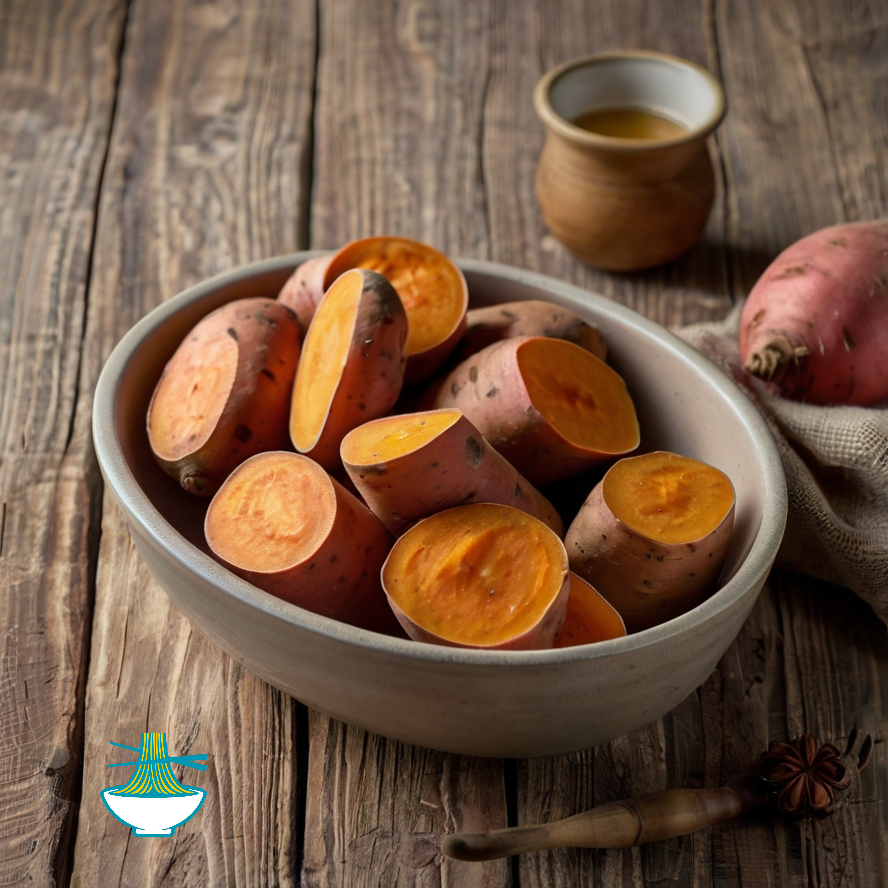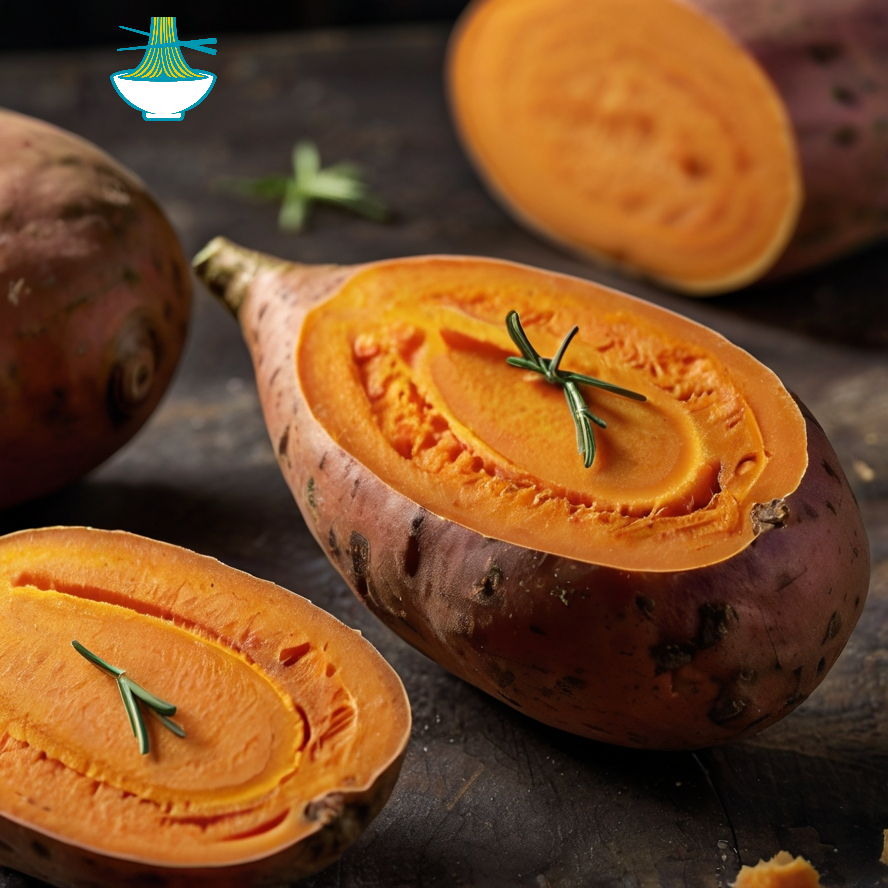Sweet potatoes are a versatile and nutritious side dish that can be prepared in many ways, including boiling, baking, or mashing. Known for their naturally sweet flavor and vibrant orange color, they are an excellent source of vitamin A, which supports eye health, and fiber, which aids digestion. Sweetpotato also contains antioxidants like beta-carotene, which protect the body from oxidative stress and promote skin health. While they are nutrient-dense, it’s important to prepare them without excessive sugar or fats to maintain their health benefits. Incorporating sweet potatoes into your diet is an easy way to add a tasty and nutritious element to your meals.
Ingredients:
- 4 medium-sized sweet potatoes
- 2 tablespoons olive oil
- Salt and black pepper to taste
- 1 teaspoon cinnamon (optional)
- 1 tablespoon honey (optional)
Instructions:
Preheat the Oven
- Start by preheating your oven to 400°F (200°C). This will ensure that it reaches the perfect temperature for roasting and helps the sweet potatoes cook evenly.
Prepare the Sweet Potatoes
- Wash the sweet potatoes thoroughly under cold running water. Once clean, peel the skin using a vegetable peeler, if preferred. Next, cut the sweet potatoes into cubes or wedges—whichever shape you like best. Cutting them into uniform pieces ensures even cooking and browning.
Season the Sweet Potatoes
- Transfer the cut sweet potatoes into a large mixing bowl. Add olive oil, making sure each piece is coated well. Then, season with salt and pepper to taste. If you prefer a hint of warmth and sweetness, sprinkle some cinnamon over the sweet potatoes. Mix everything together to ensure an even distribution of the seasoning.
Arrange on a Baking Sheet
- Line a baking sheet with parchment paper to prevent the sweet potatoes from sticking and to make cleanup easier. Spread the seasoned sweet potato pieces in a single layer on the baking sheet. Avoid overcrowding the pieces to allow them to roast properly and get crispy on the edges.
Roast the Sweet Potatoes
- Place the baking sheet in the preheated oven and roast for 25-30 minutes. Halfway through the roasting time, flip the sweet potatoes to ensure they cook evenly on all sides. You’ll know they’re done when the sweet potatoes are tender when pierced with a fork and have slightly caramelized edges.
Optional: Add Sweetness
- If you like a touch of sweetness, drizzle honey over the roasted sweet potatoes right before serving. This adds an extra layer of flavor, perfect for balancing the natural savory taste of the roasted potatoes.
Serve and Enjoy
- Serve the roasted sweet potatoes hot as a delicious side dish with your favorite main course. They pair perfectly with roasted meats, grilled vegetables, or even a light salad.
Ways to Incorporate Sweet Potatoes into Your Diet
Sweet potatoes are versatile and can be incorporated into a variety of dishes. Here are some ideas:
- Sweet Potato Fries: Cut sweet potatoes into strips, toss them with olive oil and your favorite spices, and bake them for a healthy alternative to regular fries.
- Sweet Potato Soup: Make a creamy soup by blending roasted sweet potatoes with vegetable or chicken broth, and add seasonings like cinnamon or nutmeg for extra flavor.
- Sweet Potato Smoothies: For a nutrient-packed breakfast or snack, blend cooked sweet potato with yogurt, a banana, and a dash of cinnamon.
You can also replace regular potatoes in many recipes with sweet potatoes for a healthier twist.
Sweet Potatoes vs. Regular Potatoes
When comparing sweet potatoes to regular potatoes, several differences stand out:
- Nutritional Value: Sweet potatoes generally contain more vitamin A, fiber, and antioxidants than regular potatoes. While regular potatoes are higher in potassium and vitamin C, sweet potatoes offer more health benefits related to eye health, digestion, and immune function.
- Glycemic Index: Sweet potatoes have a lower glycemic index compared to regular potatoes, meaning they cause a slower rise in blood sugar levels. This makes them a better option for people with diabetes or those looking to maintain stable blood sugar levels.
Warnings for Specific Medical Conditions
While sweet potatoes are generally a healthy food choice, there are a few things to keep in mind for people with certain medical conditions:
- Diabetes: Despite their carbohydrate content, sweet potatoes have a low glycemic index, which helps manage blood sugar levels. However, people with diabetes should monitor their portion sizes and cooking methods (e.g., avoid adding excessive sugar or butter) to avoid spiking blood sugar.
- Kidney Disease: Due to their high potassium content, people with kidney disease should consult their healthcare provider before adding large amounts of sweet potatoes to their diet, as they may need to limit potassium intake.
Frequently Asked Questions
1. Are sweet potatoes suitable for people with diabetes?
- Yes, sweet potatoes are a good option for people with diabetes because they contain a high amount of fiber, which helps regulate blood sugar levels. The low glycemic index of sweet potatoes means they have a minimal impact on blood sugar, making them a better choice than regular potatoes.
2. Can pregnant women eat sweet potatoes?
- Yes, sweet potatoes are an excellent food for pregnant women. They are rich in essential vitamins and minerals, such as folate, vitamin A, and potassium, which are vital for both the mother and the developing baby. Folate is particularly important for preventing neural tube defects in the baby.
3. What are the best cooking methods for preserving the nutrients in sweet potatoes?
- To preserve the nutrients in sweet potatoes, the best cooking methods include baking, roasting, or steaming. These methods help retain the most nutrients, especially beta-carotene. Avoid boiling, as this can lead to nutrient loss in the water.
4. Can sweet potatoes be eaten every day?
- Yes, sweet potatoes can be part of a healthy daily diet. They provide essential nutrients like vitamin A, fiber, and antioxidants. However, it's important to maintain a balanced diet by including a variety of other vegetables and fruits, and to be mindful of portion sizes, especially if you are watching your carbohydrate intake.

Nutritional Values and Benefits
Nutritional values for all ingredients of Sweet Potatoes and benefits:
1. Sweet Potatoes (4 medium)
- Calories: 400
- Carbohydrates: 92g
- Fiber: 16g (64% DV)
- Vitamin A: 37,000 IU (740% DV)
Nutritional Benefit: Sweet potatoes are rich in beta-carotene, a precursor to vitamin A, which supports eye health, immunity, and skin. They are also an excellent source of fiber, which aids digestion and helps regulate blood sugar levels.
2. Olive Oil (2 tablespoons)
- Calories: 240
- Fat: 28g (healthy fats)
Nutritional Benefit: Olive oil provides monounsaturated fats that promote heart health, reduce inflammation, and support healthy cholesterol levels.
3. Cinnamon (1 teaspoon, optional)
- Calories: 6
Nutritional Benefit: Cinnamon is rich in antioxidants and has anti-inflammatory properties that help regulate blood sugar levels and improve digestion.
4. Honey (1 tablespoon, optional)
- Calories: 64
- Sugar: 17g
Nutritional Benefit: Honey is a natural sweetener that contains antioxidants and has antibacterial properties, supporting immune function and skin health.
Merged Nutritional Benefits: Sweet potatoes are a nutrient powerhouse, offering a high amount of vitamin A, fiber, and antioxidants. The addition of olive oil provides healthy fats that support heart health, while optional ingredients like cinnamon and honey can enhance flavor and offer additional health benefits like blood sugar regulation and immune support.
Additional Health Benefits of Sweet Potatoes
Sweet potatoes provide more than just vitamins and fiber; they offer a range of health benefits that can support overall well-being:
- Heart Health: The high levels of potassium in sweet potatoes help regulate blood pressure by counteracting the effects of sodium, making them a heart-healthy food.
- Bone Health: Sweet potatoes are a good source of manganese and vitamin D, which are important for maintaining strong bones and preventing bone-related disorders.
- Weight Management: Due to their high fiber content, sweet potatoes can help promote feelings of fullness, making them a great food for weight management. They can help regulate blood sugar levels and reduce cravings.
Different Types of Sweet Potatoes and Their Benefits
Sweet potatoes come in various types, each with its unique color, texture, and nutritional benefits. The three most common types are:
- Orange-fleshed Sweet Potatoes: These are the most common type and are known for their bright orange color. Rich in beta-carotene, they offer high levels of vitamin A, which supports eye health, immune function, and skin health.
- White-fleshed Sweet Potatoes: This variety has a milder flavor and is less sweet compared to the orange-fleshed variety. While it still contains beneficial nutrients like fiber and potassium, it has slightly lower levels of beta-carotene. It is also a good source of complex carbohydrates, which provide steady energy.
- Purple-fleshed Sweet Potatoes: Purple sweet potatoes are packed with anthocyanins, a type of antioxidant that has been shown to support heart health and reduce inflammation. They also have a rich, slightly nutty flavor and a firm texture when cooked.
Each type of sweet potato has its unique nutritional profile, so incorporating different varieties can add diverse benefits to your diet.


Comments